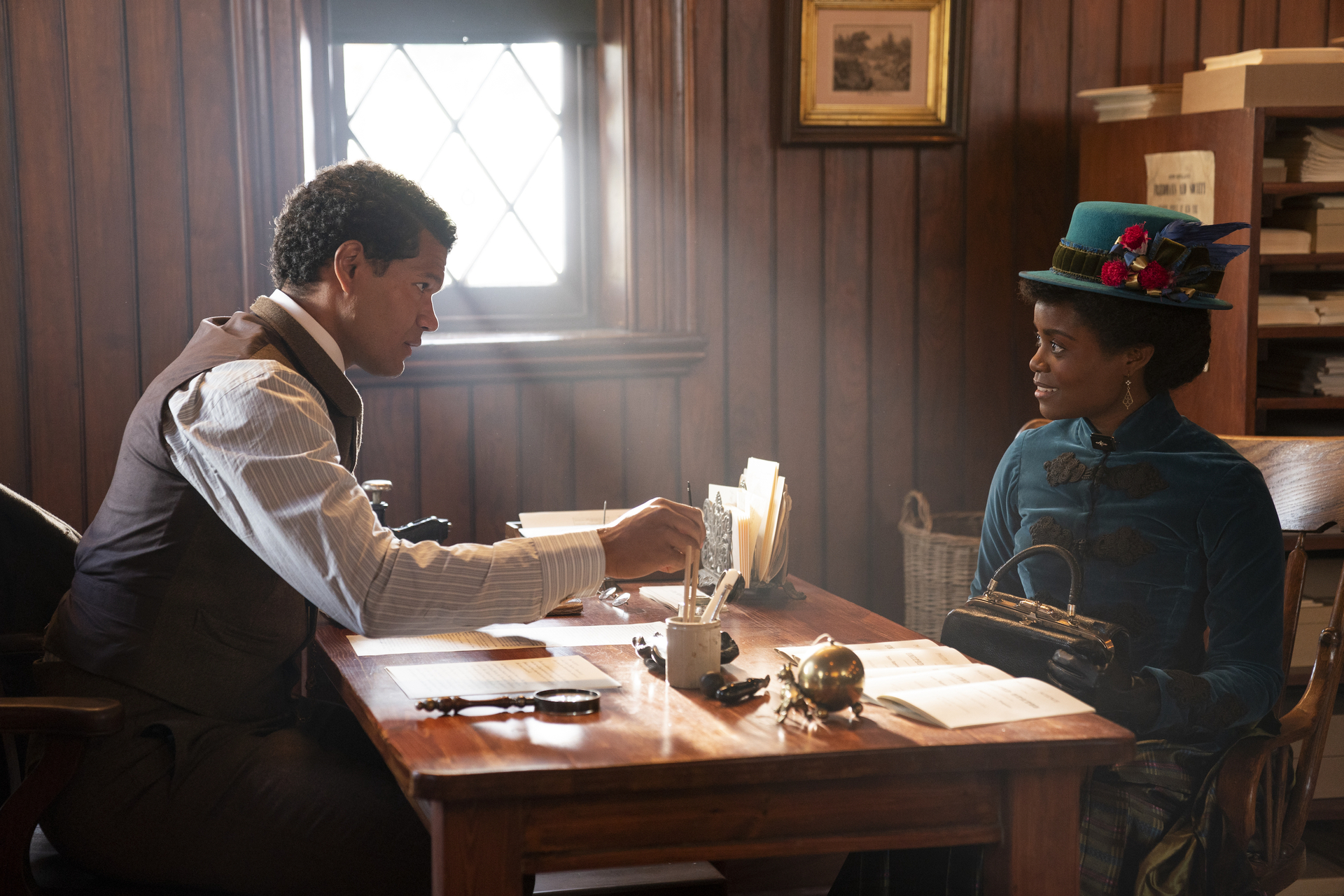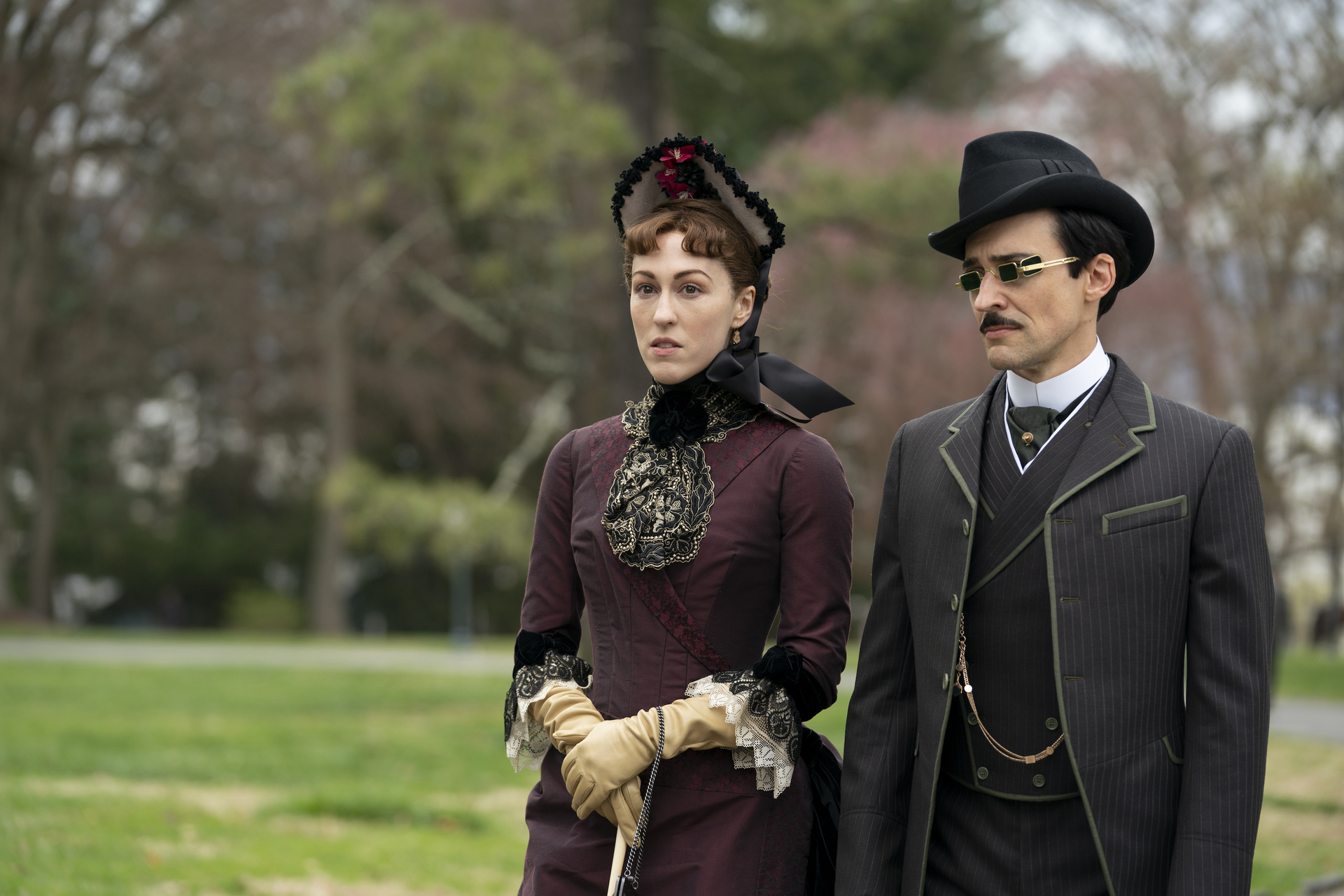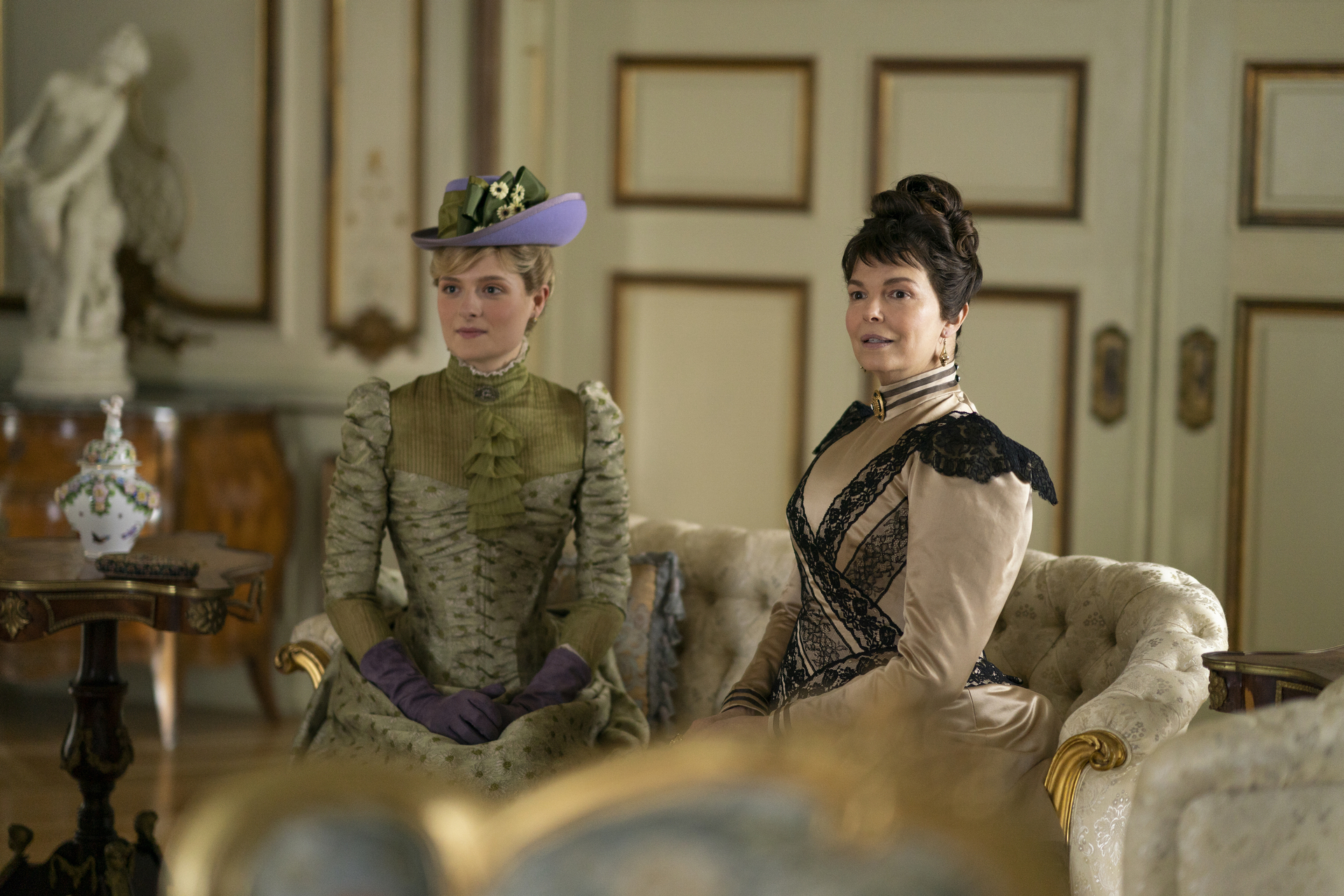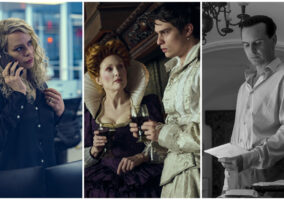
Now comes the time when all of the characters in a period drama talk about how they’re living in history and discuss the long-term implications of current events in a way no people ever actually have in history. In other words, it’s time for The Gilded Age (and Downton Abbey) creator Julian Fellowes to devote an entire episode to his absolutely favorite thing ever: People talking about CHANGE! It’s right there in the title, people! And the avatar of change for the purposes of this episode will be portrayed by ELECTRICITY! Everyone wants to talk about it and give their thoughts on what it all means! “Cooking and cleaning will all be done with electricity before you know it,” sighs the sad and mysterious Mr. Watson. “Taming electricity is probably the most important innovation of our lifetime,” Ada says with wonder. “This is a turning point in history,” warns Ward McAllister. “It’s both historic and futuristic,” Peggy notes. Everyone sounds like they’re reciting Wikipedia entries to each other.
But first, George kicks all this change talk into motion when he unveils the model for “Union Central Station” and wows the crowd with a demonstration of electricity. Given that there was no such station, we wonder if this series is meant to be about the downfall of the fictional Russell family. It would certainly give the show a much darker, potentially more interesting arc to explore. Anyway, Larry takes the moment to tell his father his plans to become an architect. Stanford White is extremely creepy in his attempts to support Larry, but then again, we suppose there’s no way to portray Stanford White that isn’t going to come off a little creepy, given how things turned out for him. George is angry and cuts off the discussion with “And now I’ll put your mother and sister in the carriage,” which is a line we wish we could use in real life. Bertha, flush from her inexplicably successful luncheon with Mr. McAllister, is delighted by electricity and wants it installed in her palace immediately. She is surprised to hear that George has been invited to Thomas Edison’s Park Row lighting ceremony and decides to use the moment to do a little social climbing.
Marian runs into a moping Larry while walking Pumpkin and wearing a pretty killer striped green dress. It feels like her wardrobe is getting showier and more stylish the longer she chafes under her aunt’s restrictions. In other words, like so many Victorians, she’s sublimating her horniness into fashion. She immediately starts giving Larry advice she is in no way qualified to give. “You must give your father time. He loves you, he won’t want to fall out,” she says with an almost delusional sense of confidence. “You have one life, Mr. Russell,” she continues, sounding a little like Yoda in a bustle, “If you take the wrong path, you will pay the price for many years.” We know this dialogue is meant to parallel the choices she has in front of her, but it’s extraordinarily clumsy.
Agnes is nonplussed at the idea that her son may have had sinful relations with a member of the servant class. Ada speaks up on Oscar’s behalf, to her sister’s shock. “Young men have to sow their wild oats.” Agnes is revolted that his oats were sown in a servant, so to speak. “What would you have preferred?” Ada asks. “An actress? A prostitute?” Agnes furiously declares that Ada shouldn’t even know such words, let alone speak them in her parlor. “You are forcing me to reevaluate your character.” After Oscar storms out from an evidently disastrous meeting with his mother, Marian is filled in on the situation. “How democratic,” she replies obnoxiously to the news that her cousin may have been inside a servant. Agnes, in the throes of mania, settles on the insane idea that Marian should go and demand that Mrs. Russell fire Miss Turner. “You know her,” she replies by way of explanation to a shocked Marian, “And besides, you’re bad about boundaries and always sticking your nose where it doesn’t belong. You’re perfect for it.” Downstairs, Bannister is cheerfully carrying on even though Agnes refuses to speak with him. This is too silly to comment on. He would be out on the street without a reference in a story that made sense.

The entire downstairs of the Russell house discuss the pros and cons of electricity, in a scene that feels about as spontaneous and natural as a TED Talk. Miss Turner sneers all over everyone’s comments and flounces out, evil personified, without any further characteristics. Later, Church tells her to get back into her cave. Upstairs, a visiting Carrie Astor is impressed by the Russells’ ballroom and name drops the various Schermerhorns and Drexels she’d invite to take part in Gladys’ coming out quadrille. That’s more than enough for Bertha to sweep into the room and turn on a dime, telling a stunned Gladys that she’ll name a date and send out the invites. As we said last week, this turn of events would be a lot more satisfying and interesting if Carrie and Gladys were shown to be a little shrewd and deliberate in their alliance, instead of more or less stumbling into giving Bertha exactly what she’s been waiting for.
A supposed note is found where George says something like “Mwah-ha-ha, fuck them kids, go for the cheap axel or something.” George says “It certainly sounds like me” but insists he didn’t write it. His lawyers tell him that a worst-case scenario could have him in jail, guilty of manslaughter. “Mr. Russell should prepare for the worst,” they say gravely. “Believe me,” Mr. Russell replies with even more gravity, “Mr. Russell is always prepared for the worst.” One presumes such attitude stems from being married to Mrs. Russell. They have yet another argument where he accuses her of caring more about the social calendar than the likelihood of him going to prison (which: true, to be fair), and she sets her jaw firmly in response before storming out and calling him a girly man under her breath.
Peggy visits Mr. Fortune at the Globe, who is also very eager to talk about electricity. He informs her of the largely unrecognized work of Lewis Latimer in developing the electric bulb. It’s another scene that’s more encyclopedia entry than conversation, but it’s at least more interesting than any of the other versions of the same conversation this episode. They take a moment to acknowledge him and joke darkly about the likelihood of him ever getting his due before moving on to the topic of the marvel of electricity itself. Mr. Fortune informs her that she’ll be on assignment getting reaction quotes from the crowd when Mr. Edison throws the switch.
Marian calls on Bertha, who is surprisingly calm about Agnes’ demand. Marian declines to say who the gentleman involved is, but it was obvious to Bertha that they were talking about Oscar. Later, she somehow gets it in her head that Turner is after Larry, which is a hilarious misread of what’s been going on in her own house. She pivots from Marian’s request to tell her that she’ll be inviting Mr. Raikes to her little carriage picnic at the Edison ceremony, but that she won’t be inviting her. Marian is disappointed, but she should have seen this coming. It’s clear why Bertha is taken with Tom Raikes. They both have the same goals. Bertha throwing Marian aside after having used her is almost certainly meant to be seen as a preview of how Tom will treat her. Leaving the Russell house, Marian runs into Tom outside, where he tells her he just hung out on the street, hoping he’d run into her. This will someday be called stalking.

Bertha coldly fires Turner, who in turn visits George’s bedroom later that night in a very silly scene that’s not even worth discussing. Turner and Oscar meet one last time in the park, dressed as Elphaba and Dracula respectively. She sneers her way through a monologue about how she wants to destroy the “she-wolf.” Her hatred for Bertha might have been an interesting thing to unpack if we had been shown one reason for it. Her last act is to leave a note for Bannister letting him know that Church was the one who threw him over, although it seems odd that this was ever even a question.
Tom and Marian meet semi-clandestinely in Mrs. Chamberlain’s sitting room. He once again declares his love for her, but this time it’s tinged with an implicit threat that even Marian is sharp enough to pick up on. “There are so many distractions in New York, so many sideshows…” He says he wants them to be “strong enough” to take hold of their future. Mrs. Chamberlain interrupts his increasingly desperate pleas to take them on a tour of the house and a tour of her own mistakes and misfortunes. She makes it clear to them both that they would be paying a huge price if they marry against her aunt’s wishes, which seems a little harsh when compared to what she went though and why. An unimpressive love match is nowhere near as scandalous as an adulterous affair and illegitimate child. She leaves them again. They start making out in her hallway. Tom pushes her even harder to rebel against her aunts. She is annoyingly placid and non-responsive in these scenes.

Meanwhile, Agnes is being imperious to a dressmaker, which we presume to be one of her hobbies. Ada pushes her on the question of Mr. Raikes and Agnes reveals that she probably wouldn’t cut off Marian if she were to marry him; she just wants them both to think that she will. Later, she and Marian have yet another standoff regarding the man and to be blunt, we’re just not sure her rigid denunciations of him make much sense. Marian isn’t her daughter, isn’t a New Yorker, and doesn’t have any money. There’s no real pressure on Agnes to ensure that her niece marries into “the 400,” nor would there be any real scandal if Marian were to marry a well-off lawyer without a pedigree. There are so many ways to explore the archaic intricacies of marriage among the Gilded Age one percent, but this setup is one of the least dramatic ways to go about it. The stakes seem so low across the board.
Larry goes to see George in his office to re-state his case for becoming an architect. It’s essentially a repeat of the scene at the top of the episode, with George relenting slightly when Larry notes he’ll likely always be “the disappointing son of a great man,” which flatters him. Taking her cue from Larry, Marian restates her case for Tom to Agnes. The conversation goes exactly as it went the other dozen times we’ve sat through it. Afterwards, Marian goes to Peggy to complain about her lot in life. Peggy didn’t want to tell her that she was going to the lighting ceremony, which is all kinds of appalling when you spend more than a second unpacking it. Marian whines about how jealous she is, as if they were two girlfriends at brunch.

Across the street, an ascendant Bertha descends her grand staircase into the waiting arms of her loving husband, who tells her he likes her spirit, evidently having forgotten that he was recently repulsed by her. “We won’t be defeated, George,” she replies. At the “picnic,” she is in her glory, beaming as Ward McAllister insists she come to Newport. The Fanes look on indulgently, with slightly furrowed brows, trying not to look nauseated by all of this open social climbing in their presence. One carriage over, Tom Raikes hits things off with his seatmate Miss Bingham, perking up considerably when she mentions her parents have a house in Newport. Aurora discreetly vomits into her reticule. Back at van Rhijn Manor, Marian looks out of windows and pouts. All this change talk has people feeling antsy! Also: horny.
For all the silliness and obviousness of the various scenes discussing the wonder of electricity, the final scene, in which a crowd of people from all corners of New York City come face to face with the idea of the 20th Century as electric light bathes their faces for the first time, was actually kind of lovely. It is ruined, of course, by a beaming Bertha, who looks upon the wonder of the age and declares, “We must go where history takes us!”
Film Independent Spirit Awards 2022 Red Carpet Rundown Next Post:
Tom Ford Fall 2022 Menswear Collection
Please review our Community Guidelines before posting a comment. Thank you!



